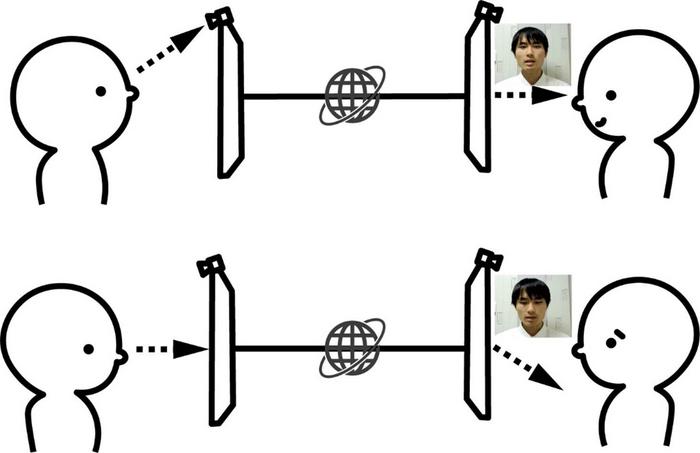Eye-contact has a significant impact on interpersonal evaluation, and online job interviews are no exception. In addition to the quality of a resume, the direction of the interviewee’s gaze might help (or hinder) their chances of securing the job.

Credit: Masahiro Shinya, Hiroshima University
Eye-contact has a significant impact on interpersonal evaluation, and online job interviews are no exception. In addition to the quality of a resume, the direction of the interviewee’s gaze might help (or hinder) their chances of securing the job.
Researchers published their results in Scientific Reports on May 31.
The study simulated online job interviews. Twelve students who participated in the study as a role of interviewees presented themselves twice, once looking directly at a web camera, and the other looking towards the screen. After recording the students’ presentation, three stimuli were created to be evaluated by 38 full-time workers. These three stimuli include the recording of the interviewee looking directly at the camera (CAM), one with the interviewee’s eye skewing downwards towards the screen (SKW) and one where only the interviewee’s voice is played without camera recordings (VO). The evaluator’s rubric has six criteria to consider when determining the scores of the interview: intimacy, social desirability, general job abilities, decisiveness, cooperativeness and overall hireability.
The results indicate interviewers evaluate candidates more positively when their gaze is directed at the camera (i.e., CAM stimulus) compared to when the candidates look at the screen (SKW stimulus). The skewed-gaze stimulus received worse evaluation scores than voice-only presentation (VO stimulus). Throughout an online interview, it is challenging to maintain “genuine” eye contact — making direct and meaningful visual connection with another person, but gazing into the camera can accomplish a similar feeling online as direct eye contact does in person.
While the evaluators overall preferred interviewees who maintained eye contact with the camera, an unconscious gender bias appeared. Female evaluators judged those with skewed downward gazes more harshly than male evaluators, and the difference in the evaluation of the CAM and SKW stimuli for female interviewees was larger than the male interviewees. This gender bias within the study could be prevalent under non-experimental conditions. Making both interviewers and interviewees aware of this potentially systematic gender bias could help curtail this issue.
“The key takeaway from our study is the negative impact of skewed gaze on evaluation in the context of online job interviewing: do NOT keep your eyes on the screen,” said Masahiro Shinya, researcher at Hiroshima University and one of the co-first authors of the study.
Simply starting with the optimal direction of gaze can increase the favorability of the interviewee significantly compared to having a downward skewed gaze. Using the “mutual gaze” effect can aid in establishing a level of trustworthiness and credibility with the evaluator. These two factors can be just the leg up an interviewer needs to move forward in the interview process. However, it’s still important to consider the other criteria the evaluators were basing their choices on, as well as potential biases that, while not ideal, can still factor into the decision-making process.
“The ultimate goal is to develop guidelines and tools that enhance understanding and management of visual attention in video conferencing, thereby improving interaction quality and evaluation fairness in remote settings,” said Noriko Yamane, researcher and co-first author of the study.
Although it’s easy to downplay the importance of eye contact and the impacts a lack of genuine eye contact can have on digital interactions, it’s unlikely the role it plays won’t factor into the overall impression of how hireable an interviewee is. In a time where digital communication is almost the new standard, uncovering subtle, non-verbal cues can significantly affect how an individual is perceived in a professional setting when interfacing through a computer screen.
Masahiro Shinya and Noriko Yamane of the Graduate School of Humanities and Social Sciences at Hiroshima University, Yuki Mori of the School of Integrated Arts and Sciences at Hiroshima University, and Brian Teaman of the Department of International and English Interdisciplinary Studies at Osaka Jogakuin University contributed to this research.
JSPS Kakenhi Grant-in-Aid (22K00621) supported this research.
###
About Hiroshima University
Since its foundation in 1949, Hiroshima University has striven to become one of the most prominent and comprehensive universities in Japan for the promotion and development of scholarship and education. Consisting of 12 schools for undergraduate level and 4 graduate schools, ranging from natural sciences to humanities and social sciences, the university has grown into one of the most distinguished comprehensive research universities in Japan. English website:
Journal
Scientific Reports
Article Title
Off-camera gaze decreases evaluation scores in a simulated online job interview
Article Publication Date
31-May-2024



